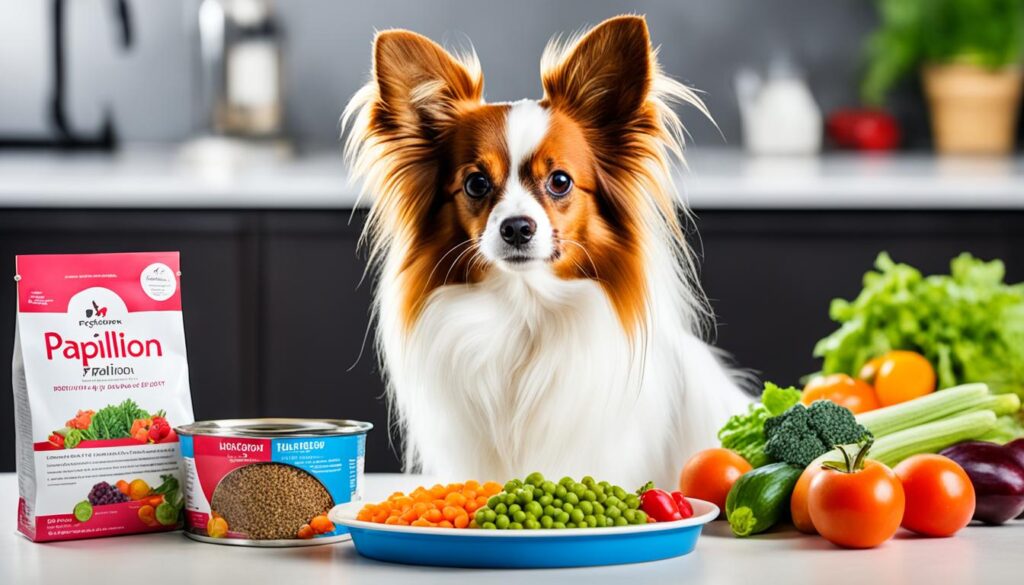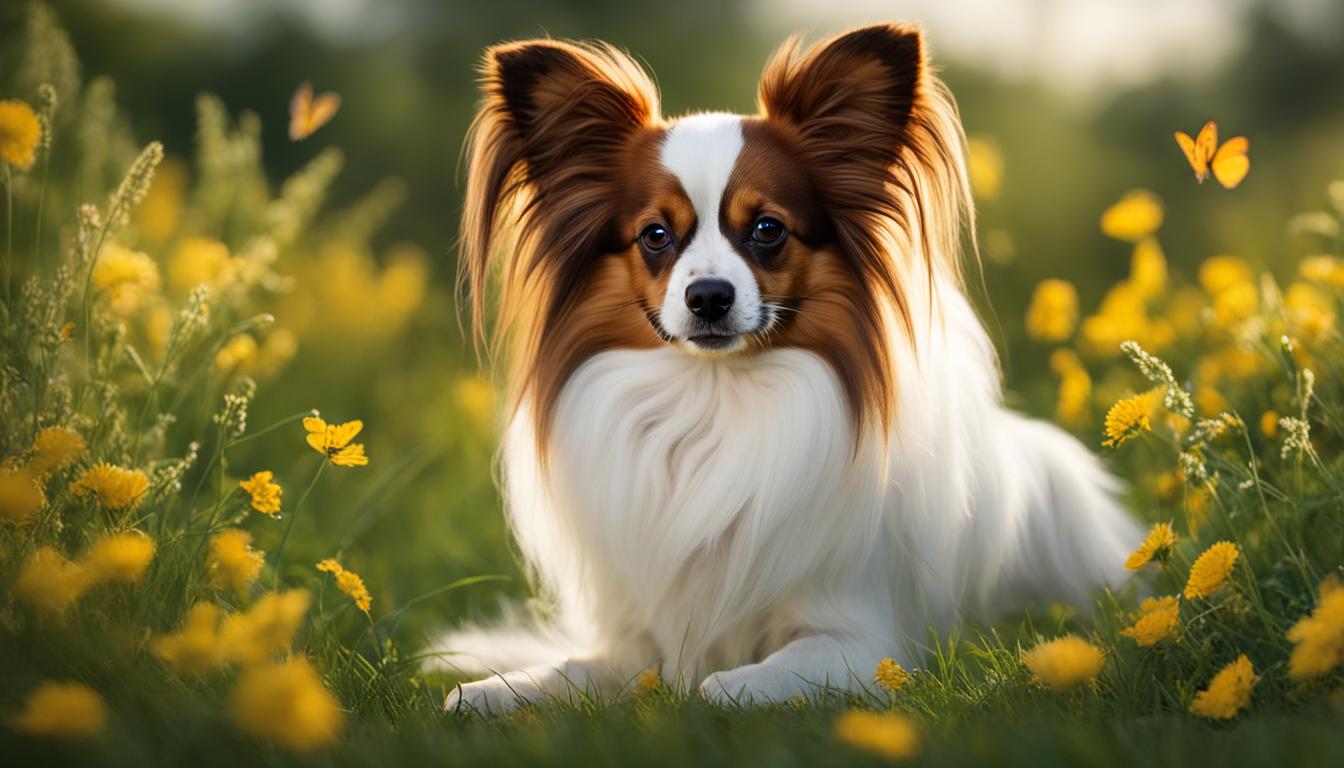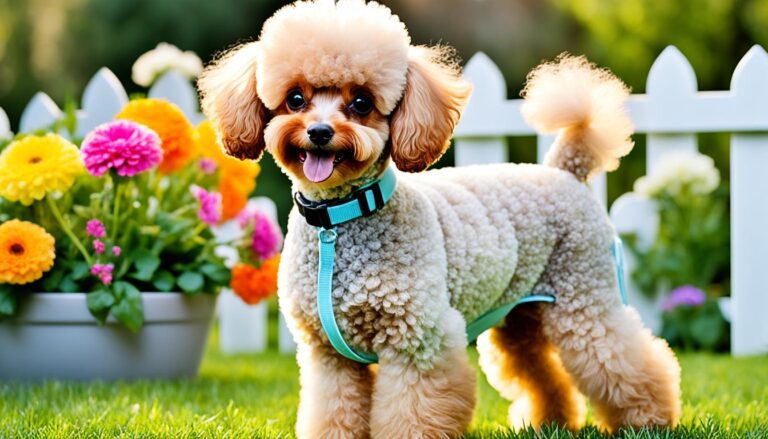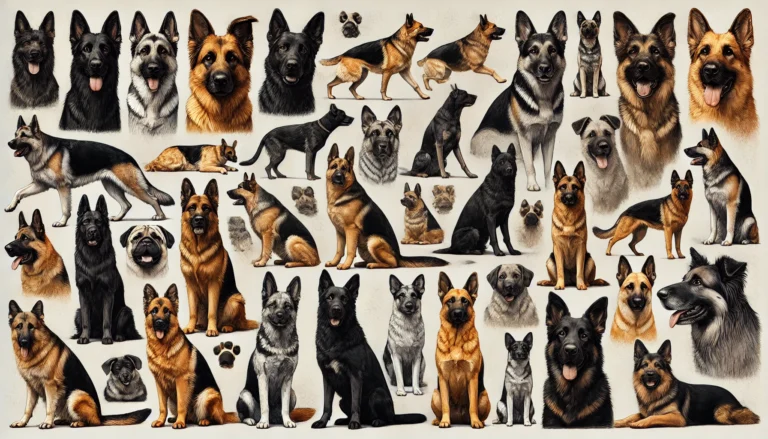Papillon Full Description: Dog Breed Insights
Did you know that the Papillon, a small dog breed with butterfly-like ears, has been depicted in paintings by Old Masters since the 16th century? These charming dogs may be small in size, but they have a rich history and a sparkling personality that captivates anyone who meets them. In this article, we will explore the full description of the Papillon breed, including their characteristics, temperament, care requirements, training tips, health considerations, and fascinating facts. Whether you’re a current Papillon owner or considering adding one to your family, this guide will provide you with valuable insights about this delightful breed.
Key Takeaways:
- The Papillon is a small, playful dog breed with butterfly-like ears.
- They have a rich history and have been depicted in paintings since the 16th century.
- Papillons are highly active and excel in agility and obedience competitions.
- They require regular exercise, grooming, and mental stimulation.
- These dogs are known for their sparkling personalities and love companionship.
Origin and History of the Papillon
The Papillon, a toy spaniel breed, has a captivating history and origin that traces back to France. This elegant breed is believed to have descended from the Continental Toy Spaniel, which Spanish traders introduced to France during the 16th century.
Originally bred as companions for royalty and nobles, the Papillon quickly gained recognition for its charming demeanor and exquisite appearance. This breed’s regal presence is well-documented in paintings and tapestries, showcasing their elegance and grace throughout history.
Continental Toy Spaniel: The Ancestral Connection
The Continental Toy Spaniel played a significant role in shaping the Papillon breed we know today. Its arrival in France marked the beginnings of the Papillon’s development, with breeders selectively breeding these delightful dogs for their distinctive features and friendly temperament.
“The Papillon’s history is closely intertwined with its Spanish roots and the influence of the Continental Toy Spaniel. Their journey from Spain to France has left an indelible mark on this breed’s captivating charm and refined elegance.” – Notable Papillon Historian
| Papillon History Highlights | |
|---|---|
| Origin: | France |
| Descendant of: | Continental Toy Spaniel |
| Role: | Companion for royalty and nobles |
| Depicted in: | Paintings and tapestries |
Papillon Size and Physical Characteristics
When it comes to size, Papillons are small dogs that typically stand between 8 and 11 inches tall at the shoulder. Their compact stature makes them a favorite choice for those who prefer dogs on the smaller side. In terms of weight, Papillons typically weigh between 4 and 8 pounds, making them lightweight and easily portable.
One of the most distinctive features of the Papillon is its long, silky coat, which requires regular grooming to keep it looking its best. The coat comes in various colors, but the most common are white with black, tan, or brown markings. This beautiful coat adds to the elegance and charm of the Papillon breed.
Another striking feature of the Papillon is its ears. They are characterized by their unique shape, which resembles butterfly wings. These feathered ears are not only adorable but also add to the overall beauty of the breed. It’s important to note that despite their delicate appearance, Papillon ears are actually quite sturdy and require minimal maintenance.
“Papillons are small dogs with a distinctive appearance due to their long, silky coats and butterfly-like ears.”
To better understand the physical characteristics of Papillons, here is a visual representation:
| Papillon Size | Papillon Weight | Papillon Coat | Papillon Ears |
|---|---|---|---|
| 8-11 inches tall | 4-8 pounds | Long, silky | Feathered, butterfly-like |
Note: The data presented in the table is a summary of the Papillon’s size, weight, coat, and ear characteristics for easy reference.
Overall, Papillons are small but stunning dogs with a distinct appearance. Their size, coat, and ears are just some of the traits that make them unique and easily recognizable. Whether it’s their elegant coats, feathery ears, or compact size, Papillons are sure to charm anyone they meet.
Papillon Temperament and Personality
Papillons are known for their happy, outgoing, and intelligent temperament. They have a playful and affectionate nature, which makes them excellent companions for individuals and families.
Despite their small size, Papillons have a big personality and are not afraid to express themselves. They are confident and self-assured, always ready to explore and embrace new adventures. Their lively and spirited nature adds a spark of excitement to any household.
One of the most endearing traits of Papillons is their eagerness to please. They thrive on positive reinforcement training methods and are quick learners. Their high intelligence enables them to pick up commands and tricks with ease. Consistency, patience, and rewards-based training methods work best for their development and learning.
Papillons are generally good with children and other pets when properly socialized. Their friendly and sociable nature makes them adaptable to various social situations. They enjoy interactions and forming strong bonds with their human family members, often becoming loyal and devoted companions.
“The Papillon’s playful and affectionate nature makes them excellent companions.”
Temperament and Personality Characteristics:
- Playful and affectionate
- Intelligent and quick to learn
- Confident and self-assured
- Sociable and friendly towards children and other pets
- Athletic and spirited
- Eager to please and responsive to positive reinforcement training
With their charm and intelligence, Papillons bring joy and happiness to their owners’ lives. Their lively and loving personality makes them a popular choice for dog lovers seeking a small, energetic companion.
Papillon Care Guide
Proper care is essential for keeping your Papillon healthy and happy. In this section, we will discuss the important aspects of Papillon care, including grooming, exercise, and overall health.
Grooming your Papillon
Papillons have long, silky coats that require regular grooming to keep them looking their best. Here are some grooming tips:
- Brush your Papillon’s coat regularly to prevent matting and tangles. Use a slicker brush or comb to gently remove any knots.
- Consider occasional professional grooming to maintain the coat’s health and appearance.

Exercise and Mental Stimulation
Papillons are active dogs that thrive on daily exercise and mental stimulation. Here’s how you can keep them entertained:
- Take your Papillon for daily walks to provide them with physical exercise. Aim for at least 30 minutes of exercise each day.
- Engage your Papillon in playtime activities such as fetch, tug-of-war, or puzzle toys to keep them mentally stimulated.
Papillon Health
While Papillons are generally healthy, they may be prone to certain health issues. Here are some common health concerns:
- Patellar Luxation: This is a condition where the kneecap slips out of place. Regular veterinary check-ups can help monitor and manage this condition.
- Dental Problems: Papillons are prone to dental issues such as tooth decay and gum disease. Regular brushing and veterinary dental care are important for maintaining their oral health.
A balanced diet and regular veterinary check-ups are vital for the overall well-being of your Papillon. Consult with your veterinarian to ensure your Papillon receives appropriate preventive care and a diet tailored to their specific needs.
| Common Health Issues | Prevention and Management |
|---|---|
| Patellar Luxation | Regular veterinary check-ups to monitor the condition. Maintaining a healthy weight and providing appropriate exercise. |
| Dental Problems | Regular brushing and dental check-ups. Feeding a balanced diet and providing dental chews or toys for oral hygiene. |
Training Tips for Papillons
When it comes to training Papillons, their intelligence and willingness to please make them quick learners. Positive reinforcement training methods work best for these charming and energetic dogs. Let’s explore some valuable training tips that will help you establish a strong bond with your Papillon and ensure their obedience and socialization.
Socialization for Well-Rounded Dogs
Early socialization is crucial for Papillons to develop into well-rounded and confident dogs. By exposing them to various people, animals, and environments from a young age, you will help them feel at ease in different situations. Socialization also helps prevent fear-based aggression and anxiety. Take your Papillon to puppy socialization classes, organize playdates with other friendly dogs, and expose them to different sights and sounds.
Consistency is Key
Papillons thrive in an environment with clear rules and boundaries. It’s important to establish consistent training routines and expectations. Use the same commands and hand signals consistently, and make sure all family members are on the same page. Papillons are intelligent and can easily pick up on inconsistencies, so maintaining a consistent approach will yield better results.
Patience and Positive Reinforcement
Training a Papillon requires patience and a positive approach. Avoid harsh training methods or punishment, as they can lead to fear and anxiety. Instead, focus on rewarding good behavior with treats, praise, and playtime. Papillons respond well to positive reinforcement, such as clicker training and treats. Make the training sessions short and engaging, as their attention span may be limited.
“Training a Papillon requires patience, consistency, and positive reinforcement. By creating a structured and positive training environment, you can achieve great results with your Papillon.”
Engaging Activities
Papillons are highly energetic and love to learn new tricks. Engaging them in mentally stimulating activities like agility, obedience, and puzzle toys will keep them physically and mentally challenged. These activities allow them to channel their energy into something productive and build their confidence.
Training Tips for Papillons
| Tip | Description |
|---|---|
| Start early | Begin training and socialization as early as possible to establish good habits. |
| Be positive | Use positive reinforcement, rewards, and praise to motivate and encourage your Papillon. |
| Be consistent | Establish clear rules and boundaries, and maintain consistency in your training methods. |
| Keep it short | Training sessions should be short and focused to match the Papillon’s attention span. |
| Make it fun | Incorporate games, toys, and mentally stimulating activities into the training process. |
By following these training tips, you can nurture a well-behaved and obedient Papillon who is a joy to be around. Training not only helps them become good canine citizens but also strengthens the bond between you and your furry friend. With consistency, patience, and positive reinforcement, your Papillon will thrive and bring endless happiness to your life.
Papillon Nutrition and Feeding Guidelines
When it comes to keeping your Papillon healthy and happy, nutrition plays a crucial role. Providing your furry friend with a balanced diet is essential to support their overall well-being and ensure they receive the necessary nutrients for optimal growth and development. In this section, we will discuss the importance of choosing the right food for your Papillon, feeding guidelines, and nutritional considerations.
Choosing the Right Food
When selecting food for your Papillon, it’s important to choose a high-quality dog food that meets their specific nutritional requirements. Look for a dog food formula that is specially formulated for small breeds and takes into account their unique needs. Pay attention to the ingredients list, and ensure that proteins, such as chicken or fish, are listed as the first ingredients.

“Providing your Papillon with a balanced diet is crucial for their overall health and well-being. Choose a high-quality dog food formulated for small breeds.”
Feeding Guidelines
The feeding guidelines for your Papillon will depend on factors such as their age, weight, activity level, and overall health. It’s important to follow the recommended portion sizes provided on the dog food packaging as a starting point. However, it’s essential to monitor your Papillon’s weight and adjust the portions accordingly to avoid underfeeding or overfeeding.
As puppies, Papillons have small stomachs and fast metabolisms. It’s recommended to provide them with frequent, smaller meals throughout the day to prevent low blood sugar levels. As they grow into adulthood, you can transition to feeding them two to three small meals per day to maintain their energy levels and prevent obesity.
Nutritional Considerations
Papillons have specific nutritional needs that should be taken into consideration. Here are some important factors:
- Protein: Ensure that the dog food you choose contains an adequate amount of high-quality protein to support your Papillon’s muscle development and maintenance.
- Fat: The right amount of healthy fats, such as omega-3 fatty acids, will help support your Papillon’s skin and coat health, as well as provide them with essential energy.
- Carbohydrates: Choose a dog food that includes wholesome carbohydrates like whole grains and vegetables. These will provide your Papillon with sustained energy throughout the day.
- Vitamins and Minerals: Ensure that the dog food contains essential vitamins and minerals, such as vitamin E, vitamin D, and calcium, to support your Papillon’s overall health and immune system.
Always consult with your veterinarian to determine the best feeding schedule and dietary options for your Papillon based on their individual needs. They can provide personalized recommendations and guidance to help you make informed decisions about your Papillon’s nutrition.
| Food Group | Recommended Servings |
|---|---|
| Protein (chicken, fish, lean meats) | 1-2 servings per day |
| Vegetables and Fruits | 1-2 servings per day |
| Whole Grains (brown rice, quinoa) | 1-2 servings per day |
| Dairy (yogurt, cheese) | Occasional treats |
Remember to provide fresh, clean water at all times to keep your Papillon hydrated. Avoid feeding them any toxic foods or ingredients, such as chocolate, onions, grapes, or excessive amounts of salt.
Papillon Health Issues and Care
While Papillons are generally a healthy breed, they may be prone to certain health issues. It is important for owners to be aware of these conditions and take proactive steps to ensure their Papillon’s well-being.
Patellar Luxation
One common health issue in Papillons is patellar luxation, a condition where the kneecap temporarily dislocates from its normal position. This can cause discomfort, limping, and difficulty walking. In severe cases, surgery may be required to correct the issue. Regular exercise and maintaining a healthy weight can help prevent this condition.
Progressive Retinal Atrophy (PRA)
Papillons can also be susceptible to progressive retinal atrophy, a genetic eye disease that leads to gradual vision loss and eventual blindness. Regular eye examinations by a veterinary ophthalmologist can help detect the condition early, allowing for proper management and treatment if necessary.
Dental Problems
Papillons are prone to dental problems such as tooth decay, gum disease, and tartar buildup. Regular dental care, including daily brushing with a dog-specific toothbrush and toothpaste, can help maintain good oral hygiene. Providing appropriate chew toys and incorporating dental treats into the Papillon’s diet can also promote dental health.
Maintaining overall health involves regular visits to the veterinarian. Vaccinations, parasite prevention, and routine check-ups are essential for preventing and detecting any potential health issues. Papillons should be provided with a nutritious diet and regular exercise to support their well-being.
Furthermore, grooming plays a crucial role in Papillon care. Regular brushing of their long, silky coat helps prevent tangles and mats. This breed may also require occasional professional grooming to maintain their coat’s condition. Cleaning their ears regularly and trimming their nails are important aspects of their grooming routine as well.
In summary, while Papillons are generally healthy dogs, it is important for owners to be aware of specific health issues that may affect the breed. Regular veterinary care, proper dental hygiene, and appropriate grooming practices are essential for maintaining a Papillon’s well-being and ensuring they lead a happy and healthy life.
Papillon Fun Facts and Famous Papillons
Did you know that the name “Papillon” comes from the French word for butterfly, referring to their distinctive ears? These elegant and playful dogs are known for their unique appearance and vibrant personalities. Here are some fun facts and famous Papillons that have made their mark:
- In the movie “Wolf of Wall Street,” a Papillon named “Bella” stole the show with her adorable antics.
- In the comedy film “Click,” a Papillon named “Princess” brought laughter to the screen with her comedic timing.
- “The Bracelet of Bordeaux” featured a Papillon named “Bijou” as a loyal companion to the main character.
These movie appearances showcase the charm and adaptability of Papillons, as they effortlessly bring their captivating energy and charisma to the big screen.
Not only are Papillons popular in the entertainment world, but they have also excelled in various dog sports and competitions. Their athletic abilities and intelligence make them ideal candidates for agility, obedience, and flyball. Despite their small size, Papillons leave a lasting impression with their incredible agility and performances.
Papillons have a way of capturing hearts with their big personalities and confident presence. Whether they are strutting on the silver screen or competing in dog sports, these delightful dogs never fail to make an impact.
Papillon Fun Facts Recap:
- The name “Papillon” refers to their distinctive butterfly-like ears.
- They have appeared in movies like “Wolf of Wall Street,” “Click,” and “The Bracelet of Bordeaux.”
- Papillons excel in dog sports and competitions.
- Despite their small size, they leave a lasting impression with their athleticism and vibrant personalities.
Conclusion
The Papillon is a charming and elegant dog breed that captures the hearts of many. With a rich history and distinctive characteristics, they have become beloved companions for both families and individuals alike. Their highly active nature, intelligence, and sociable disposition make them a joy to be around.
Providing proper care, training, and socialization is essential for Papillons to thrive in various environments. Regular exercise, mental stimulation, and positive reinforcement training are key to keeping them happy and well-behaved. With the right love and attention, they can become well-rounded dogs that bring immense happiness to their owners.
It’s important to remember that every Papillon is unique, with specific needs and preferences. By considering their individual requirements, grooming and healthcare can be tailored to ensure their well-being. Regular veterinary check-ups, a balanced diet, proper grooming, and dental care are crucial for maintaining their overall health.
In conclusion, Papillons are truly captivating. Their elegance, playfulness, and unwavering loyalty make them a breed like no other. Whether they’re showing off their agility skills or simply curling up on your lap, Papillons bring immense joy and companionship. If you’re looking for a dog that combines charm, intelligence, and a big personality in a small package, the Papillon breed is an excellent choice.
FAQ
What is the history of the Papillon breed?
The Papillon is thought to have originated from the Continental Toy Spaniel, which was brought to France by Spanish traders in the 16th century. Originally bred as a companion for royalty and nobles, Papillons have a rich history and were often depicted in paintings and tapestries.
How big do Papillons get and what are their physical characteristics?
Papillons are small dogs, typically standing 8-11 inches tall at the shoulder and weighing 4-8 pounds. They have a distinctive appearance with their long, silky coats and feathered ears, which resemble butterfly wings. Papillons come in various coat colors, but the most common are white with black, tan, or brown markings.
What is the temperament of a Papillon?
Papillons are happy, outgoing, and intelligent dogs. They have a playful and affectionate nature, making them great companions. Despite their small size, Papillons have a big personality and are not afraid to express themselves. They are generally good with children and other pets when properly socialized.
How should I take care of my Papillon?
Papillons require regular grooming to maintain their long, silky coat. This includes brushing to prevent matting and occasional professional grooming. They are active dogs that need daily exercise, such as walks, playtime, and mental stimulation. Regular veterinary check-ups and a balanced diet are important for their overall well-being.
What are some training tips for Papillons?
Papillons are intelligent dogs and respond well to positive reinforcement training methods. They enjoy learning new tricks and participating in activities like agility. Early socialization is crucial to ensure they grow up to be well-rounded dogs. Consistency, patience, and positive reinforcement are key when training a Papillon.
What should I feed my Papillon?
The best diet for a Papillon depends on their individual needs, age, and activity level. It is important to choose a high-quality dog food that meets their nutritional requirements. Papillons should be fed small meals throughout the day, especially as puppies, to prevent low blood sugar. Portion control is important to avoid obesity.
Are there any health issues I should be aware of with Papillons?
While Papillons are generally a healthy breed, they may be prone to certain health issues like patellar luxation, progressive retinal atrophy, and dental problems. Regular veterinary care, including vaccinations and dental check-ups, is important for maintaining their overall health. Proper grooming, including regular brushing, ear cleaning, and dental care, is essential.
Are there any fun facts or famous Papillons?
The name “Papillon” comes from the French word for butterfly, referring to their distinctive ears. Papillons have been featured in movies like “Wolf of Wall Street,” “Click,” and “The Bracelet of Bordeaux.” They are known for their athletic abilities and have excelled in various dog sports and competitions.


![How Long Do Dogs Live?: A Guide to Canine Longevity]](https://quitepuppy.com/wp-content/uploads/2024/07/a10ff4f2-a61e-41d2-acfe-4551674a08a7-1-768x768.webp)
![give me an image for [Types of Pitbulls ]](https://quitepuppy.com/wp-content/uploads/2024/07/9c16c8fd-490f-458f-ace3-0950f7c09281-768x768.webp)



